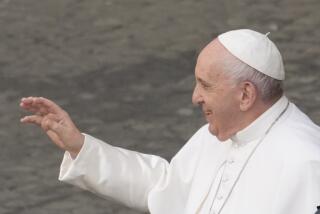Vatican Warns Theologians Not to Dissent
- Share via
VATICAN CITY — Asserting central authority with a severity unprecedented in the reign of Pope John Paul II, the Vatican on Tuesday bluntly told Roman Catholic theologians--and by extension questioning Catholics--that it will not tolerate public dissent from official church teachings. “The Christian faith is not a leisure-time activity, and the church is not a club, similar, or different, to any other,” said West German Cardinal Joseph Ratzinger, the church’s custodian of orthodoxy. He is the author of a 7,500-word “Instruction” for theologians and bishops that was released Tuesday with papal approval.
“Standards of conduct, appropriate to civil society or the workings of a democracy, cannot be purely and simply applied to the church,” the document warns.
It asserts that the 850-million member church is by nature and divine inspiration a hierarchical institution that requires obedience to central authority personified by the Pope.
Under the doctrinally conservative John Paul, the Vatican has proscribed dissenters ranging from Latin American exponents of radical liberation theology to European arch-conservatives under breakaway Bishop Marcel Lefebvre. Tuesday marked the first time in this papacy, though, that it has generically addressed theological dissent.
The “Instruction,” described by Vatican officials as long in the making in response to what Ratzinger termed the growth of “new theology,” is itself a church teaching, since it bears John Paul’s formal approval.
It is certain to trigger protest among liberal American and West European theologians who have publicly challenged the Vatican on issues of faith and morals such as birth control and the imposition of unpopular choices to bishoprics and chairs of theology.
Issued by Ratzinger’s watchdog Congregation for the Doctrine of the Faith, the “Instruction on the Ecclesial Vocation of the Theologian” orders theologians who question elements of church teaching to express their reservations within the church, but not publicly.
“The theologian should avoid turning to the mass media, but have recourse to the responsible authority, for it is not by seeking to exert the pressure of public opinion that one contributes to the clarification of doctrinal issues and renders service to the truth,” the document says.
Theologians who cannot intellectually accept the church’s stand on a particular issue are advised by the “Instruction” to seek solace “in silence and prayer, but with the certainty that if the truth really is at stake, it will ultimately prevail.”
“Freedom of the act of faith cannot justify a right to dissent,” the document asserts, because man owes God “the rational homage of his faith.” For the same reason, neither can dissent be justified as a matter of following one’s conscience, the “Instruction” teaches.
Dissent is dangerous because it threatens the unity of the universal church and the apostolic teachings that are its foundation, the document warns.
“To succumb to the temptation of dissent . . . is to allow the leaven of infidelity to the Holy Spirit to start to work,” it insists.
The “Instruction” coldly rejects the assertion of some American and West European theologians that public objection to the church ban on artificial birth control is permissible because it has not been declared infallible.
In January, 1989, a group of 163 German-speaking theologians challenged what they called the Vatican’s abuse of papal authority to ban artificial birth control.
As in the United States, the majority of West European Catholics practice birth control, often with at least the tacit consent of their priests and bishops. Tuesday’s “Instruction” warned, though, that even when a papal teaching is not declared infallible, as in the case of birth control, it is divinely inspired and therefore must be obeyed.
Last year’s “Cologne Declaration” also complained of Vatican high-handedness is naming think-alike conservative professors of theology. Liberal dioceses in Germany have also attacked the calculated Vatican appointment of conservatives as bishops.
In response to a reporter’s question, Ratzinger told journalists that the “Instruction” had not been drafted specifically in response to the Cologne criticisms. Rather, he said, the Vatican had long contemplated a need to redefine the theologian’s role within the framework of church teaching.
Theological ferment in postwar decades, he said, has brought bishops and theologians “into unexplored territory” in which, after the ecumenical council known as Vatican II in 1962-1965, theologians “came to feel themselves real masters of the church and of its bishops.” This, he said, unacceptably uncut the Vatican’s ultimate teaching authority.
Underlining its importance, the Vatican issued the “Instruction” simultaneously in eight languages, with Latin as the official text. The tone of the English translation is uncompromisingly authoritarian in asserting papal primacy and the church’s right to discipline those who challenge church doctrine.
Two prominent dissident theologians, Father Charles Curran of Catholic University in Washington, D.C., and West German professor Hans Kung, have lost teaching posts as a gesture of Vatican ire. The Vatican has also restricted the authority of liberal Archbishop Raymond Hunthausen of Seattle for his teachings on sexual morality.
Catholics must respect such acts of discipline, the “Instruction” insists.
“Even if not guaranteed by the charisma of infallibility, (they) are not without divine assistance and call for the adherence of the faithful.”
More to Read
Sign up for Essential California
The most important California stories and recommendations in your inbox every morning.
You may occasionally receive promotional content from the Los Angeles Times.













